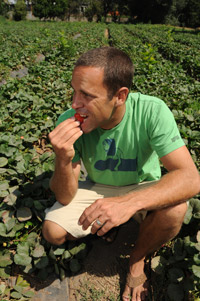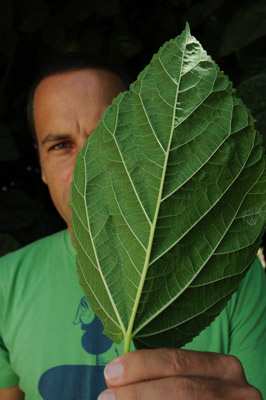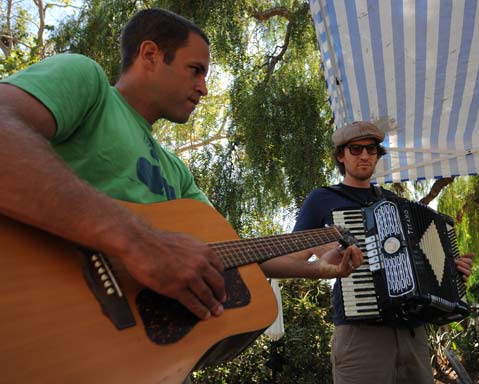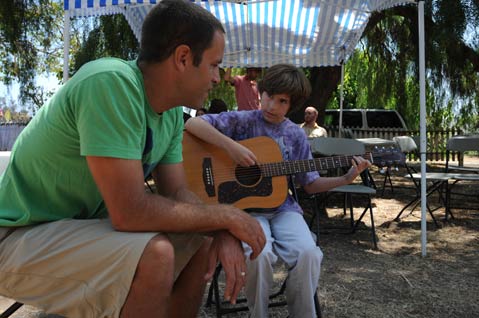The Rockstar Who Would Save the World
How the Jack Johnson Family Is Making Musicians, Concert Venues, and Fans Rally 'Round the Earth

Strawberry shortcakes just might save the world, and that’s why Jack Johnson is spending the last Friday morning of July on his knees, picking the ripe red fruits from a green patch at Goleta’s Fairview Gardens. Surrounding the world-famous surfing rock star, UCSB alum, and sporadic Montecito resident are children gathering strawberries, including two towheaded boys of his own, but mostly kids from the garden’s summer farm camp. Together, in a much-needed exercise for all ages, they’re learning exactly where our food comes from, how it gets onto our plates, and why eating locally grown vegetables and fruits-even if that equates to sweet tooth-friendly strawberry shortcake-is the first step in global salvation.
The Goleta patch-picking is part of a tour that Jack and his extended musical family are taking through the 12.5-acre property, which is a model of urban-based, community-supported agriculture renowned the world over. While his kids have played in the green shade of the mulberry tree and examined the honeybees making a comb on the farmhouse’s chimney, the adults have chatted about the particulars of crop rotation and discussed the ins and outs of goat cheese production.

But impressive as the gardens are, the sights and sounds aren’t new to Jack and crew, for this is just one stop of many that they’ve taken while crisscrossing the planet as part of his 2008 Sleep Through the Static tour. Amid face-to-face interactions with eco-minded groups from Japan to Germany, Jack’s brought his family to the Eden Project in Cornwall, England, where biodiversity displays are seasonally shifting below otherworldly domes, and to Melbourne, Australia’s Centre for Education and Research in Environmental Strategies, or CERES, where a village-sized model for a sustainable society recycles all its waste and runs on renewable energy.
While these sessions don’t involve sound checks or screaming fans, they’re just as integral as the music-playing part of the ongoing Jack Johnson Tour, which began in Australia in March, jumped from Asia to Europe, landed earlier this summer in North America, and is coming home to roost in California this week, peaking on Wednesday, August 27, with a homecoming concert at UCSB’s Harder Stadium.
While playing the mellow campfire rock that he perfected in an Isla Vista bedroom to sold-out crowds worldwide, Jack has been fostering a message of environmental responsibility, giving support to regional and international nonprofits, and teaching the masses that small steps toward a healthier future make all the difference. In addition to hosting nonprofit booths at every concert, personally reaching out to each organization, and demanding eco-friendly practices at all of the venues, Jack launched the All at Once community, a Web site-based (allatonce.org) network that connects fans with the environmental cause they support and gives them incentives to join the organizations that do something about it. All told, 2008’s Jack Johnson Tour may go down in history as one of the most forward-thinking and sustainable of all time.

Earlier this year-and just as his fifth studio album, Sleep Through the Static, debuted at number one on the American pop charts and stayed there for three weeks- Jack spoke to me over the phone from his home on Oahu’s North Shore about his upcoming world tour. “As a musician, you can go out there and say, ‘I do drugs and drive fancy cars,’ and make kids think that’s cool,” he said. “Or you can go out and do something positive.” With the help of his wife Kim and an assembled team of progressive-minded, make-it-happen people, Jack chose the latter, and the world is already better for it.
“What Jack and Kim and company are doing is the most thoughtful and effective and committed environmental tour that’s ever been done,” said Michael Martin, a 20-year veteran of the concert business and founder of the progressive marketing firm MusicMatters, which is managing some aspects of the current tour. “What they’re doing with the education on the ground, the greening of the tour, the fan outreach with All at Once, and the contributions they’re giving, it’s really unprecedented.”
The Model
Jack Johnson isn’t the first rock star to worry about the environment, nor is he the first to invite nonprofits to his concerts, donate profits to charitable causes, or urge his fans into progressive action. But he may be the first to do these things all at once (name makes sense, eh?) with such global breadth, quantifiable efficiency, and lasting impacts after a concert’s final note is played. For Jack’s ’08 tour, the eco-minded train pulls into town way before the biodiesel-fueled busloads begin unloading equipment.
This preemptive strike happens in two ways: The first is under the umbrella of All at Once, when regional nonprofits are hand-picked by Jack’s staff to be featured on allatonce.org and set up a booth at the nearby concert venue, given a $500 donation and offered up to $2,500 in matching monies, and provided free tickets to use for fundraising and awareness-building in their respective communities. Nearly 180 nonprofits were involved from Sydney to Tokyo to London to Indianapolis-about a handful at every tour stop-and in each venue, they get to set up tables and connect with fans on a convention-like area called the Village Green.
Additionally, four major nonprofits have accompanied the tour: the Surfrider Foundation (specifically with its Rise Above Plastics campaign), Climate Counts, Vote for the Environment, and HeadCount, a mix that cross-promotes carbon-reduction programs, voter registration, environmental policy, and everyday green living. As an enticement to visit all the booths, Village Green visitors get stamps on a passport, and those with enough get entered into a raffle for a chance to watch Jack’s set from the stage. (For more info on these groups and the 15 regional ones being supported in Santa Barbara, see the sidebar on page 35.)
The woman in charge of this operation is “nonprofit liaison” Jessica Scheeter, the wife of Jack’s keyboardist Zach Gill (see the sidebar on page 36 to learn about Gill’s solo debut) and a former employee of the City of Santa Barbara’s creeks division. The job “seemed a great fit for me, because it’s so fun to find great groups doing great work in communities,” Scheeter said while walking through Fairview Gardens on that warm Friday in July. “It’s an inspiring place to be focusing your energy on finding groups doing good work in their own community, and bringing them into a network, and then plugging in the fans and other people.”
Scheeter has worked extensively with her friend-and Jack’s wife- Kim Johnson, who developed the idea for All at Once with MusicMatters’s Martin. One day, Kim sent Martin an eight-page wish-list, and all three of them worked to develop a networking system that bridges fans with environmental groups via an online social network, putting thousands of people with similar interests and eco-passions in touch with like-minded souls. So now, explained Martin, “It’s like MySpace meets Environmental Defense Fund meets Jack’s fan club.” To date, more than 23,000 people have signed up so far at allatonce.org, where users are rewarded with new Jack Johnson songs and videos if they support nonprofits with money or work or even just stop using disposable grocery bags. Together, they’re living the organization’s motto that “individual actions multiplied by millions create global change.”

The second preemptive strike fired by the Johnsons’ camp, and the one most likely to continue reverberating in the music industry, is the EnviroRider. A “rider” is the contract between a venue, promoter, and artist that typically lists what sort of water, whiskey, and wine the musician wants, how much food to buy, what’s needed to unload their equipment, how many stage lights are desired, and all the forgotten particulars that come along with live music. The requests range from standard (three six-packs of Heineken, deli sandwiches, and three gallons of water, for instance) to picky (whiskey on Wednesdays, vodka if it’s a Thursday, California rolls with only real crab) to illicit (two eight balls of blow and three ladies of the night) to downright bizarre (incense-burning altar, labels removed from bottled water, and don’t let the drummer have any booze past 10 p.m.). The EnviroRider then, as the name suggests, is an additional part of Jack’s contract that demands a venue and promoter adhere to rigorous environmentally friendly practices.
Among stated requirements (which are subject to penalties for noncompliance) and strongly urged suggestions (which will likely be requirements next time), venues are mandated to provide ample recycling opportunities, to allocate special parking spaces for carpoolers and hybrid vehicles, and to offset their carbon emissions with the help of a worksheet to tally them. They are asked to recycle at least 50 percent of the total waste generated, to use biodegradable trash bags, and, if possible, to eschew all bottled water in favor of water stations and refillable containers. Food for catering must come from nearby farms. Low-flow toilets, compact fluorescent lights, and biodiesel or low-sulfur diesel generators are also listed on the rider. (For a full copy, see independent.com/envirorider.)
It’s not the first time Jack’s used an EnviroRider-he began using it on his 2005 tour, at the suggestion of Kim. She had contacted Martin after hearing that he had crafted a similarly minded document back in 1991 for Steve Miller, at a time when concert tour greening had its first, albeit brief, brush with popularity. (That rider went into effect a handful of times for special events, said Martin, but it was a series of one-off shows, and never caught on with the industry.) So Martin dusted off the old version, sent it to some environmental groups such as the Sierra Club and experts from the Union of Concerned Scientists for vetting and advice, and then “spruced it up for the 2000s.”
Kim admitted that, at first, there was a slight struggle getting every venue to agree because, she opined, “Everyone is resistant to change.” But it’s since caught on because it makes sense financially. The new EnviroRider, it seems, is sticking.
“A promoter in Germany told me that over the years, they’ve seen so many crazy things on riders, like, ‘Pick out the red M&Ms,'” Gill said recently. “But he thought that at least this was something in the end that seems positive for everyone.”
A lot’s changed since the early ’90s, explained Martin. “In 2005, the entire attitude in the industry has changed,” he said. “Now major venues and promoters are rushing to be as green as they can. So when the EnviroRider comes along, it’s really valuable to them. It gives them the tools and resources to achieve that.”
The Makers
Growing up on the North Shore with the world-famous Pipeline Break literally in his backyard, it’s little wonder that Jack Johnson could have become a professional surfer had he not opted for the college experience at UCSB, where he studied filmmaking and is still remembered as a gifted cinematographer. As a surfer who appreciates clean water and pristine shorelines, it’s also little wonder where he gets his motivation for supporting such organizations as the Surfrider Foundation and Heal the Ocean. He began aligning with those two nonprofits in the early days of his career when playing venues like the Jolly Tiger on Carrillo Street or SOhO in conjunction with his 2001 debut record Brushfire Fairytales. As a proud Hawaiian amassing considerable fame, wealth, and influence in the ever-popular beach life culture, one could have also predicted that Jack would start something like the Kokua Festival, an annual concert event in Waikiki whose proceeds pay for environmental education in the schools of Hawai’i.
Still, how does Jack-who admits he wasn’t any sort of environmental activist at UCSB-intertwine himself with carbon offset strategists, community farmers, urban tree planters, and the other sorts of green-minded folks associated with All at Once? One word: Kim, the woman from Monterey, California, whom he met during his freshman year at UCSB in the De la Guerra dining commons.
Although Jack is the one with his face on the cover of Rolling Stone and the voice coming out of speakers worldwide, Kim Johnson deserves much of the credit for both his successful career and his eco-friendly image. She was the visionary behind the Kokua Festival, which hosts a number of Hawaiian nonprofits each year, and wanted to take a piece of that on the road for the 2008 world tour. That’s where the idea of the Village Green came about, and, as mentioned, Kim was also integral to the use of the EnviroRider and the creation of the All at Once community, which, based on her experience running the Kokua Foundation, she is striving to make as useful as possible for nonprofits. So what’s her motivation?
It turns out that while Jack was busy playing keg parties in Isla Vista with his band Soil, Kim was soaking up UCSB’s rampant environmentalism and getting some hands-on education about sustainable living. During summer 1994, she worked at the former Risley Farms on Hollister Avenue selling locally grown produce from a roadside stand. It was an eye-opening experience, revealing just how simple yet critical it is for communities to grow their own food, which she has come to see as the lynchpin for the entire sustainability movement.
When she moved seven years ago with Jack to Hawai’i, where 90 percent of the food is shipped in and small farms are “going out like crazy,” that understanding only deepened. “Hawai’i is just like everywhere,” explained Kim of the challenges faced by a society that tries to have every fruit available in every season, “but because of the finite space and how far away we are, it just heightens it.” They planted a garden in their first home, and enjoyed tending it with their nieces and nephews.
“You have such a higher respect for food when you see it from the beginning,” explained Kim, who said that one of her nieces now wants to be a chef. “You don’t want to throw away anything. You cherish that piece of food.” When she had her own children, the mantra of community gardening only grew louder, and now her kids know what to do with animal poop (composting and fertilizer) and Jack’s stoked on growing his own taro patch. “There are so many lessons we’ve learned in the garden,” said Kim. “It’s better to teach hands-on [about food] than from a text book.”
The need for community farming is only growing, she believes. “Especially with increased fuel costs, you can’t just ship things halfway across the world just to have strawberries all year,” said Kim. “You have to eat seasonally.” Two years ago, after having studied the local foods movement carefully for about four years, Kim started a farm-to-school program in Hawai’i and thinks that such programs are the panacea to so many of today’s social ills, from childhood obesity to global warming, and is happy to see it catching on in places all over the world. “I feel like farm-to-school solves a whole lot of problems we’re facing now,” said Kim. “It’s such a rapid and best solution to so many things.”
Jack, for his part, is perfectly smitten to be the messenger, as he’s always considered himself more of a family man and community-minded citizen than some chart-topping rock star. Before announcing his 2008 tour, Jack even seriously wondered whether he “would make less of a footprint by staying home” due to a world tour’s undeniable environmental impacts. Then he realized, “For us to go out and make a positive change in the music industry has a more positive effect than me just staying home and doing nothing. : If, after we leave, people go forward with the connection we help to make while we’re there, that makes touring worth it. It makes me feel like we do leave a place better than before we showed up.”
One place he’s excited to leave better is UCSB, where Harder Stadium fits more fans (up to 15,000 people) for less money than his usual Santa Barbara Bowl concerts and can better accommodate the sprawling Village Green. But he’s most excited that so many of his fellow Gauchos will be in attendance, because he sees this as the exact time that they need to hear the message. College kids are “at that age when they’re figuring out the way they’re going to approach the world,” explained Jack. “Doing a show like this gets the kids talking about [sustainability]. It shows them that it’s not a dorky thing to think about.”
Of course, it also helps that both Johnsons probably are the most approachable, friendly, kindhearted, and down-to-earth people on the planet. “Jack and Kim’s motivations are so pure,” said Martin. “That’s why it works. : They’re doing this because it’s the right thing to do and they want to have a positive impact. This is not about Jack Johnson.” Echoed Jim Moriarty, the executive director of Surfrider, “It’s an understated, under-promised, and over-delivered approach to environmentalism. Jack’s the anti-politician. He’s not promising anything. He’s just doing it. He’s putting his money where his mouth is.”

The Meaning
So can a music-making, wave-riding beach bum really save the world? Well, if you believe the response of people who’ve already been touched by the tour, the forecast looks good.
“We’re finding success in terms of connecting with people regardless of whether they live on the coast or whether they surf,” said Moriarty of Surfrider, which has accompanied Jack to every show on four continents as a major outreach part of its Rise Above Plastics campaign. “Everyone just loves the beach. Everyone is concerned about ocean pollution. What they’re searching for is something they can do.” New chapters are being formed because of the tour, and existing chapters are getting boosts because of the visceral reaction people have to the very tangible issue of ridding the ocean of plastics.
Jack’s most acute effect is on the regional nonprofits that have become part of All at Once. Robby Astrove works for Trees Atlanta, a 25-year-old group whose mission is to protect and improve urban environments by planting, caring for, and educating about trees in the Southeastern metropolis. Though he’s not sure how his organization got hand-picked by Jack’s crew, Astrove was overjoyed about the experience. “It was really inspiring to see the environmental world and the world of music coming together,” he said the morning after the Atlanta concert, his voice raspy from chatting with so many fans at his booth the night before. “We were able to connect with a lot of people. I just love that face time with people, and we had lot of good genuine conversations. : [Jack] really did a lot for us.” Astrove was most impressed with the practical sustainability push. “[Jack] really made it simple and accessible for people. It was about being the greenest you can be. Wherever you are in that spectrum, just try to take it to the next little step,” explained Astrove. “I think that’s important, because everyone is in a different situation. Not everyone is gonna get a hybrid.”
In Indiana, Kevin Hardie runs Friends of the White River, an organization that educates and protects the Midwestern state’s largest watershed. “I’ve never been treated better as a volunteer group or felt like I had as much value,” said Hardie of the All at Once experience. “It not only worked, it’s still working as a result.” He was appreciative of the challenge to connect with a “totally new audience,” and the group has since fostered that connection with film screenings and other events. Plus the chance to find younger members is something Hardie, a self-described “middle-aged fat guy,” knows is a key to the future of organizations like his. He explained, “The only way it continues to get better 20 years from now is to pass it to the next generation.” And Jack is the perfect bridge, believes Hardie. “He’s the real deal, to use the Midwestern term.”
As for the success of the EnviroRider, co-creator Martin is nearly ecstatic, even though he’s already witnessed concert tour greening come and go in the mid 1990s. “It’s being passed around among other tour managers and other bands,” he said, explaining that Jack has become the industry’s green standard in the past 20 months. “This is my hope: that it gets disseminated and becomes the de facto standard.” And it is catching on across the pond, too. “Environmental riders have been steadily increasing during the last year, both in the frequency we see these and in the quality of them,” explained Andrew Haworth, environmental manager of Live Nation in Britain, which put on the U.K. leg of the tour. “However, this was the most complete I’ve seen so far. It covered all areas of the tour and challenged us to think about what we were doing.” Live Nation in America-the world’s largest concert promoter-has purchased thousands of recycling containers with the EnviroRider as the catalyst, according to Martin, and some venues have changed their practices permanently.
One such venue is the USANA Amphitheatre in Utah. The associated promoting agency’s vice president Dave McKay said the rider was “eye-opening,” and explained, “It has been quite a change, and setup costs were fairly expensive, but it will prove to be a savings in the long run, both financially and environmentally.” The changes have extended beyond the venue itself and into the company’s offices, where, McKay said, “Our entire staff truly thinks and does things more consciously.” And it goes beyond Jack. “This year, I see more and more artists asking and requiring Earth-saving measures at their concerts,” said McKay. “I also see the audiences respecting and appreciating the new rules of living.”
The Message
Back in Goleta, on that sunny summer Friday at Fairview Gardens, Jack ended his visit by playing some songs for the summer camp as they sat on haystacks beneath the sycamore and willow trees outside the historic white farmhouse. With a guitar in his hands and Zach Gill on accordion at his side, Jack chatted casually with the mesmerized kids and perhaps more star-struck counselors about music-making and poetry writing, about how to play different instruments, and about tending both real gardens of soil and figurative gardens of life.
As he smoothly sang a mix of hits and never-before-heard songs, the scene suddenly struck me as cult-like- fascinated followers rocking their entranced heads in unison as their charismatic guru spread his simple but powerful message of love for each other and Earth. Fortunately, our imperiled world would welcome a few Jack Johnson cults, but unfortunately, Jack’s not brainwashing new members into his family anytime soon.
That doesn’t mean that we can’t follow in his footsteps and form our own tribe of eco-warriors. We could take small steps everyday toward cleaning up our planet. We could volunteer for good causes at least once a month. We could connect with our fellow men and women on the most positive level at every second of the day. And, most certainly, this Wednesday at Harder Stadium, we can-as Jack sings in his radio hit “Upside Down”-“sing and dance to Mother Nature’s song.”
4•1•1
Jack Johnson, Rogue Wave, Paula Fuga, and the Culver City Dub Collective play UCSB’s Harder Stadium on Wednesday, August 27, at 7 p.m. Tickets are still available, so call 893-3535 or see jackjohnsonmusic.com. For more on how to save the world with Jack’s help, see allatonce.org.



